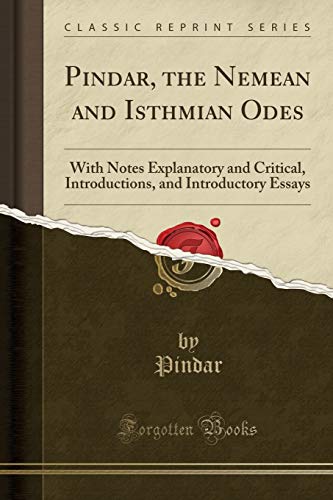Pindar, the Nemean and Isthmian Odes
With Notes Explanatory and Critical, Introductions, and Introductory Essays (Classic Reprint)
Pindar
BOOK REVIEW

Pindar, the Nemean and Isthmian Odes draws you into a world of ancient Greek grandeur, where the echoes of triumph resonate through the verses of one of the most celebrated poets of antiquity. Pindar's work transcends mere poetry; it is a profound exploration of human achievement distilled into moving odes that immortalize the victors of the ancient games. This classic reprint not only preserves the lyrical finesse of Pindar's original compositions but also serves as a portal into the era when victory was not just celebrated; it was sanctified, molded by the hands of fate and divine influence. 🏛
As you delve into the heart of the Nemean and Isthmian Odes, a sense of reverence grips you. Each ode is a masterstroke, a tapestry woven with the threads of glory and despair, fate and free will. Every line pulses with intensity, compelling you to wrestle with the concepts of honor and mortality. Pindar, a poet revered by philosophers and politicians alike, takes you on a journey through the human condition, inviting you to ponder your own victories and defeats. How does one define success in a fleeting world? Is it the laurel crown, or the legacy left behind?
Critics and readers alike have been captivated by Pindar's unique style-his use of complex meters and rich imagery. Many laud his ability to elevate the celebration of athletic prowess into the realm of the divine. Commentators note that Pindar's words resonate through history, influencing not only his contemporaries but also future thinkers and writers. His work inspired the likes of Horace and even modern poets who sought to blend personal achievement with societal commentary.
However, not everyone has embraced Pindar's idiosyncratic language and dense allusions. Some readers find the layers of meaning challenging, arguing that the beauty of his work can be obscured by its complexity. Critics often contend that the cultural references rooted in his time may distance contemporary audiences, turning what could be a universal celebration of human aspiration into an esoteric puzzle.
But therein lies the power of Pindar: he challenges you. He compels you to engage with his text deeply, to peel back the layers to discover the pearls of wisdom concealed within. This is not simply a collection of poems; it is a meditation on the pursuit of greatness, a reflection on how each individual's efforts contribute to the greater tapestry of existence.
When Pindar writes about the victors of the Nemean and Isthmian Games, he captures their essence-the fleeting nature of their triumphs and the shadows of fate that loom ahead. You cannot help but feel a pull towards this existential dance between celebrating one's achievements and acknowledging the insignificance we all face in the grand scheme of life.
Your heart races as you consider the implications of Pindar's work in today's context. How do we celebrate our victories? Are we, like the athletes of ancient Greece, trapped in a cycle of striving for glory while ignoring the lessons of humility and reflection? This book invites you not only to witness the past but to interrogate your present, to embrace the rich legacy of these odes while recognizing that they speak to your life as much as they spoke to the Greeks.
What impact does such a literary masterpiece have on modern society? You may find yourself reflecting on the values we champion today. Pindar's reverence for competition serves as a powerful reminder to balance our pursuit of success with an awareness of the collective human experience.
As you close the pages on Pindar, the Nemean and Isthmian Odes, the echoes resonate long after. The verses, laden with the weight of history and emotion, demand your attention. They challenge you to not only understand the art of victory but to redefine the meaning of triumph in your own life. Be prepared to feel that spark ignite within, compelling you to further explore not just the fabric of Pindar's world, but your very own. 🌟
📖 Pindar, the Nemean and Isthmian Odes: With Notes Explanatory and Critical, Introductions, and Introductory Essays (Classic Reprint)
✍ by Pindar
🧾 329 pages
2018
#pindar #nemean #isthmian #odes #with #notes #explanatory #critical #introductions #introductory #essays #classic #reprint #pindar #Pindar